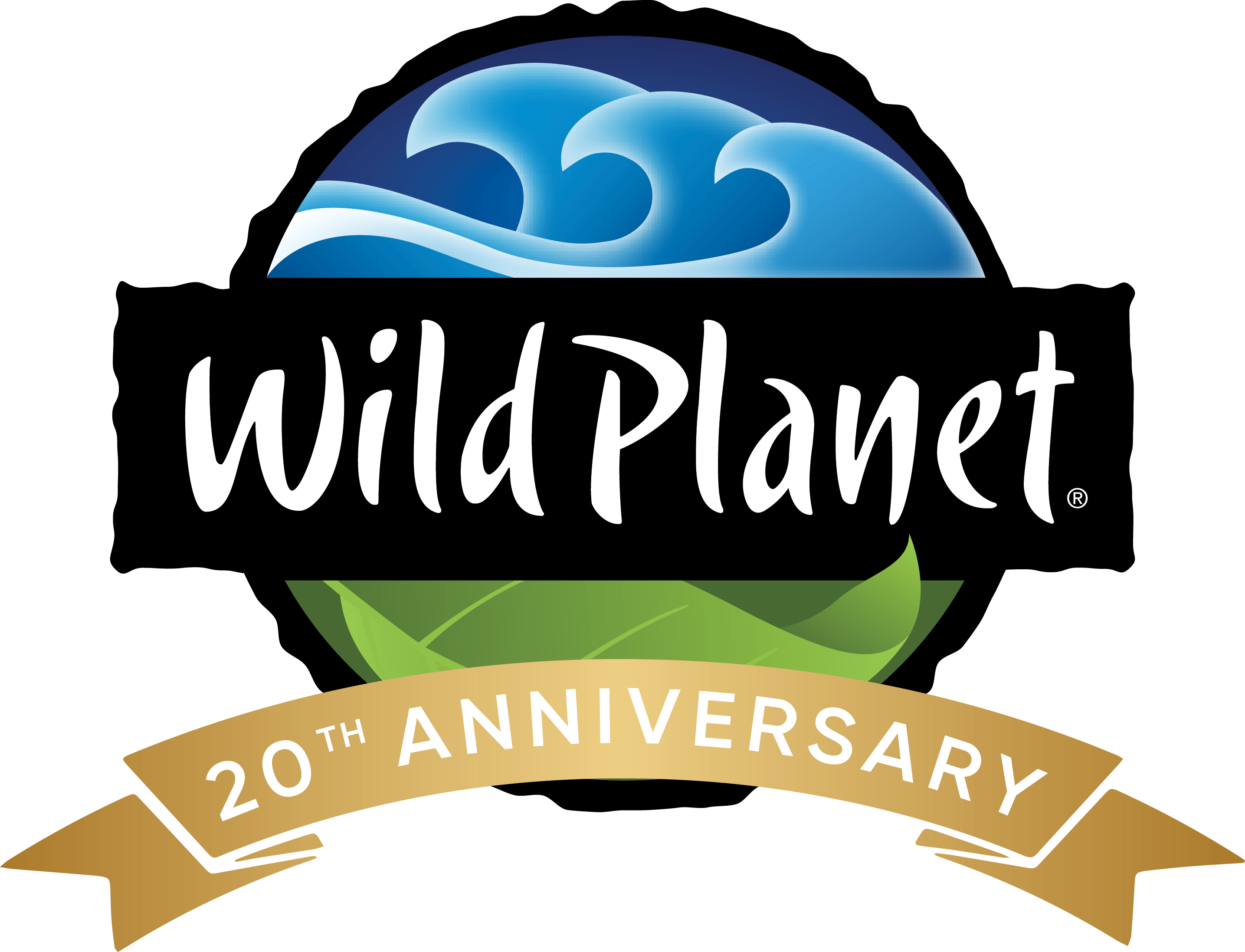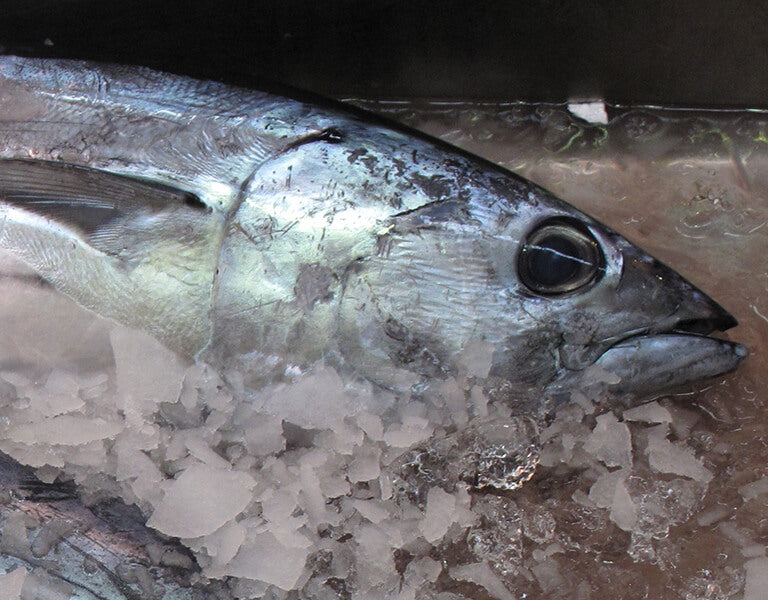- Wild Planet selects fish only from stocks that are not overfished.
- Wild Planet does not source fish from fisheries using gear that damages the marine habitat.
- Wild Planet does not source fish from fisheries that have excessive bycatch discard mortality of non-target species or of target species’ small juveniles.
These three principles govern the selection process at Wild Planet and are reviewed in the light of research and recommendations done by Monterey Bay Aquarium Seafood Watch.
With regard to tuna products specifically, we wish to communicate the following points:
- Wild Planet sources 100% of its tuna from pole & line, troll or handline fisheries.
- Wild Planet Foods does not buy any long-line or purse seine caught tuna (the three primary species).
- ALBACORE - We source in the North and South Pacific as well as the North and South Atlantic.
- Over 90% of our albacore comes from Japan and the US.
- SKIPJACK - We source in the North and South Pacific as well as Indian Ocean in the cases of Indonesian and Maldivian pole & line skipjack fleets.
- Over 90% of our skipjack comes from Japan.
- YELLOWFIN – We source from the South Atlantic Brazilian handline fishery.
- Wild Planet uses the true name of each tuna including genus and species on its packaging.
- Since much fish designated as Fish Aggregating Device (FAD)-FREE is caught aboard vessels which continue to primarily use FADs, Wild Planet refuses to buy any fish from any vessel participating in the use of FADs.
- Wild Planet supports the recommended establishment of Marine Protected Areas in the four proposed Pacific States Non-Exclusive Economic Zone (Non-EEZ) Enclaves.
- Wild Planet does not source from Marine Protected Areas nor from areas currently being proposed.
- Wild Planet supports reductions of long-line effort on North Pacific and South Pacific Albacore brood stocks.
- Wild Planet supports 100% observer programs on all long-line and purse seine vessels of industrial scale.
- Wild Planet refuses to source from the Mediterranean until after it ceases to be considered overexploited through managed reductions of catch.
- Wild Planet sources 100% of its tuna from small-scale fishery participants, most of whom fish and unload their catch in their own country.
- Wild Planet supports the SELECTIVE reduction of effort on all tuna stocks by reducing capacity of long-line and FAD purse seine vessels.
- Wild Planet supports preferential access to the total allowable catch by pole & line, handline, and troll catch method efforts practiced by local fleets fishing within their own EEZs.
- Wild Planet supports this shift of access from vessels practicing FAD and long-line fishing, to pole & line, handline, and troll fleets in order to promote these most environmentally sound harvest methods.
- The buying of fish that has been transshipped at sea, vessel to vessel, is prohibited.
- Wild Planet supports and advocates for full-retention fishing (keeping and selling everything caught, instead of discarding less desirable species overboard, as bycatch mortality). One hundred percent of Wild Planet’s tuna sourcing is from vessels retaining all bycatch mortality for utilization. (Pole & line and troll fishing has a bycatch rate of <0.5%.)
The following Greenpeace positions are now adopted as part of Wild Planet's sourcing policy:
- Not to source any tuna that is found on Greenpeace’s red list, is overfished, is experiencing overfishing, is listed as Vulnerable, Threatened or Endangered on the International Union for Conservation of Nature (IUCN) red list.
- Not to source any tuna from vessels where at sea transshipments have taken place and only source tuna that has been transshipped in designated ports by the relevant Regional Fishery Management Organization (RFMO).
- Promote the reduction of overcapacity by not trading with companies that are actively adding new vessels to the global registry.
- Source only from vessels and processing facilities by companies that are operating under International Labor Organization core conventions.
- Ensure all tuna comes from companies that support fair wages, safe working conditions and have not been found in violation of any human rights abuses. Wild Planet takes even allegations of human rights abuses seriously and engages with vessels, canneries and contract facilities to ensure remediation and respect for social welfare and labor justice.
- Ensure all tuna can be tracked from fishing vessel to can to shelf. Currently all Wild Planet lot codes are traceable to individual pole & line or troll fishing vessels comprising each lot code. This information is available for Environmental Non-Governmental Organizations (ENGO) or Retailer auditing on TraceRegister.com.
- Do not source tuna originating from vessels and/or operators blacklisted by Greenpeace.
Sustainability Discussion
Wild Planet and its founder have led the sustainable tuna category since 2001. At that time, retail and industry participants were paying very little attention to the sustainable seafood movement. Wild Planet based its sourcing policies upon the Monterey Bay Aquarium Seafood Watch (MBASW) scientific studies and recommendations. These have consistently pointed to pole & line, troll and handline fishing as the only GREEN rated, BEST CHOICE fisheries for tuna, including albacore, yellowfin and skipjack. Long-line and purse seine catch methods have always been rated either yellow or red by MBASW.
Wild Planet has always sourced 100% of its albacore, yellowfin and skipjack tuna from pole & line, troll and handline fisheries. These have substantially lower bycatch mortality than long-line or purse seine fisheries. All Wild Planet lot codes are 100% traceable to pole & line, troll and handline tuna fisheries. Detailed catch data for every delivery of tuna is documented on the National Oceanic and Atmospheric Administration (NOAA) Form 370 Certificate of Origin.
Each Wild Planet lot code entering the market is tracked on the seafood data platform Trace Register. Within Wild Planet’s Trace Register account can be found every canned tuna lot code produced by Wild Planet and all the NOAA 370 forms and buying documents tied to those lot codes. These forms document all the tuna purchases comprising the individual lots of canned tuna. The forms contain the following data points:
- Vessel name and country flag
- Purchase document
- Trip dates and area of catch
- Catch method (pole & line, troll or handline)
- Total weight of landing
- Dolphin safe statement
Retailers and ENGOs are welcome to review any or all the Wild Planet lot code back-up documents to verify that the claim of 100% pole & line, troll or handline sourcing is correct and verifiable. An extensive random audit can be done in a couple of hours. A number of natural food retailers have stringent sourcing standards and do conduct this random audit. The presence of Wild Planet products at every natural food retailer nationwide is evidence of our highest standard adherence. The audit process is simple and straightforward, as there is no issue of segregation of pole & line, troll or handline fish from long-line or purse seine fish. Such mingling cannot occur as we have NEVER purchased those other products.
Comparison of Sustainability Claims
Many brands have made claims of “sustainably sourced” or “responsibly caught.” There is no FDA standard for use of such terms on a can label. If the catch method is not stated on the label, a claim of “sustainably-caught” should be doubted. Some brands are claiming that the presence of an eco-logo like Marine Stewardship Council (MSC) is evidence of highest sustainability and traceability.
There is no stronger tuna sustainability claim than 100% pole & line, troll or handline caught. This is evidenced by the third party recommendations of MBASW. Their recommendations for albacore, skipjack and yellowfin tuna are summarized on their tuna recommendation summary page:
https://www.seafoodwatch.org/recommendations/search?query=%3Aspecies%3BTuna
Note that only pole & line, troll caught or handline tuna consistently achieve the GREEN (Best Choice – buy first) recommendation. Wild Planet’s tuna products come almost entirely from these GREEN rated fisheries, less than 5% of our pole & line, troll and handline tuna come from Yellow rated fisheries.
While it is not our goal to denigrate other fishing methods, FAD purse seine and long-line fisheries do have environmental concerns and will impact the long-term viability of ocean resources, this is true whether they meet a minimum standard for an eco-logo certification or not. A reading of the MBASW full report and other scientific studies will clearly point this out.
Wild Planet chooses to not use eco-logo certifications, which do not improve our sustainable sourcing standard. If we were to allow MSC certified tuna products in our supply chain, our supply sources would be increased. In some cases Wild Planet would lower its costs, but at the expense of sourcing from fisheries we believe are environmentally problematic.
Wrap up
- Wild Planet has been sourcing ONLY sustainable tuna products longer than any other company in the US market.
- We file all of our buying documents on TraceRegister.com. These are open for review by our retail customers.
- The Monterey Bay Aquarium Seafood Watch rates the fisheries from which we source over 95% of our tuna as GREEN, and the rest are rated YELLOW.
Pole & line, trolling and handline tuna are the best choices for sustainability. There is no higher standard nor is there a more rigorous documentation of traceable assurance than that which Wild Planet is producing.

